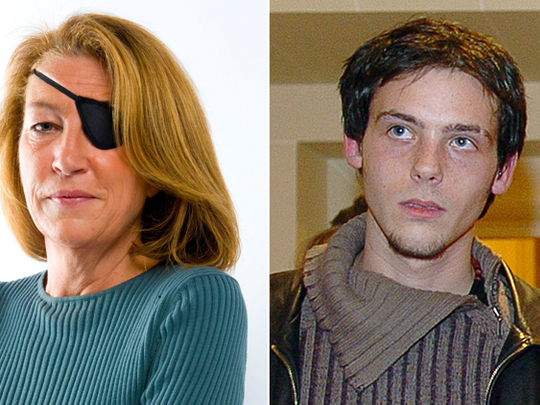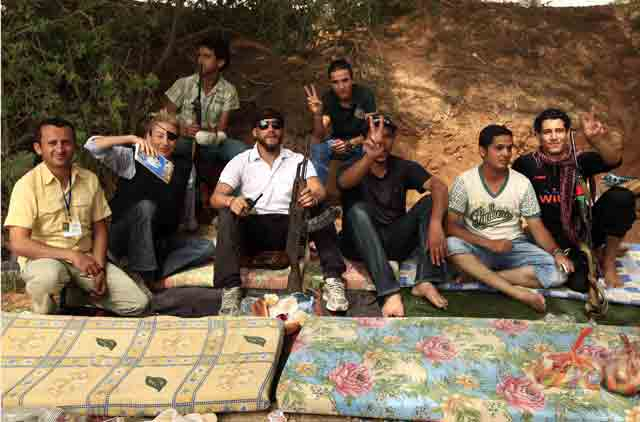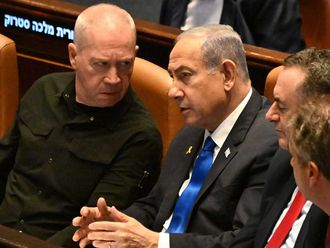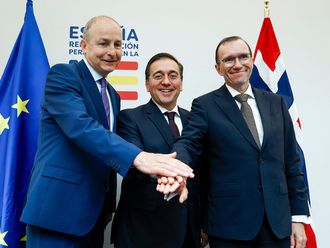
Damascus: Two Western journalists were killed Wednesday as Syrian regime forces pounded the rebel city of Homs for a 19th straight day, activists said, while calls mounted for a truce to allow in humanitarian aid.
The latest barrage came a day after security forces killed at least 68 people across Syria, bringing the overall death toll of violence since March 2011 to 7,636 people, according to the Syrian Observatory for Human Rights.
The toll includes 5,542 civilians, 1,692 soldiers and police, and 400 rebel fighters, the head of the Britain-based rights monitoring group, Rami Abdel Rahman, told AFP.
Activist Omar Shaker from inside Baba Amr told AFP that two Western journalists were killed and three others wounded as a shell crashed into a makeshift media centre set up by anti-regime militants.
The area remained the target of random shelling, blocking attempts to remove the bodies, the activist said.
France said one of the journalists killed was a French national, as the Syrian Observatory said the two journalists killed were an American woman and a French man.
French television reporter Gilles Jacquier was killed in Homs last month as a shell exploded amid a group of journalists covering protests in the city on a visit organised by the Syrian authorities.
Despite a plea by activists to allow women and children to flee Homs's besieged Baba Amr neighbourhood, more troops were sent Tuesday to the outskirts of the restive city, monitors and activists said.
A call by the International Committee for the Red Cross (ICRC) for a two-hour truce daily to deliver aid to afflicted areas gained support from the United Nations, as well as from the United States and Russia.
The call came a day after the ICRC said it was in talks with Syrian authorities and rebels to halt the violence.
Syria's main opposition group, meanwhile, demanded the international community create "safe havens" in the country and called on Russia to force the regime to allow access for humanitarian convoys.
At a news conference in Paris, the Syrian National Council said it would attend a summit of the countries known as the "Friends of Syria" and ask for safe zones to protect civilians and allow the opposition to organise.
The head of the rebel Free Syrian Army, Colonel Riyadh Al Asaad, has welcomed the humanitarian truce call but voiced doubts that the "criminal" regime would abide by a ceasefire arrangement.
And the UN under secretary general for humanitarian affairs, Valerie Amos, called on Syria to allow aid groups unimpeded access to the country.
"This is a major human rights crisis that is now moving into significant humanitarian consequences," Amos said.
In Washington, White House press secretary Jay Carney said "we support calls for ceasefires to allow for the provision of humanitarian supplies to Syrians who desperately need it."
"Reprehensible actions taken by the Assad regime have led us to a situation where basic supplies, humanitarian supplies are very scarce."
Moscow, a staunch ally of the Syrian-regime, on Wednesday also supported the ICRC call for a truce, expressing "serious concern" about the humanitarian situation, according to foreign ministry spokesman Alexander Lukashevich.
And although top US military officer, General Martin Dempsey, has said it was "premature" to arm Syria's opposition, top Republican Senator John McCain called again for the outgunned rebels to be supplied with weapons.
But State Department spokeswoman Victoria Nuland said "from our perspective, we don't believe that it makes sense to contribute now to the further militarisation of Syria.
"What we don't want to see is the spiral of violence increase. That said, if we can't get Assad to yield to the pressure that we are all bringing to bear, we may have to consider additional measures," she said.
US Secretary of State Hillary Clinton said Syria was increasingly under pressure.
The Friends of Syria meeting in Tunis on Friday will "demonstrate that Assad's regime is increasingly isolated and that the brave Syrian people need our support and solidarity," she said.
Clinton will take part in the meeting, the State Department announced Tuesday.
Russia announced that it will not take part in the meeting because it was being convened "for the purpose of supporting one side against another in an internal conflict," the foreign ministry said.
China, meanwhile, refused to commit to attend the meeting.
The Friends of Syria group will meet for the first time after being created in response to a joint veto by China and Russia of a UN Security Council resolution condemning the bloody crackdown.












